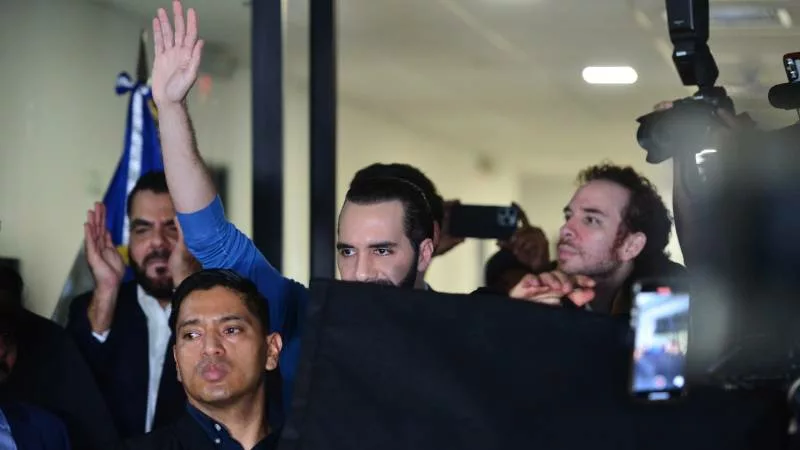There is concern among the 18 to 20 civil society organizations in the country that participate in the Permanent Roundtable for Risk Management in El Salvador, which is responsible for helping the population coordinate efforts in emergency situations, such as storms, earthquakes, floods, and other calamities the country faces.
A representative of this Roundtable spoke with El Diario de Hoy and expressed that this concern arises from how the Government is increasingly moving towards becoming a dictatorship, where power is accumulated in the figure of President Nayib Bukele, with less space for free participation of organized citizens, and more within the framework of the state of emergency.
How do you see the future extension of the state of emergency?
In the short term, the state of emergency is not seen to come to an end. Maybe in February, after the elections pass; if I’m frank, many of the organizations are expecting that after that, the shutdowns of the organizations as such will come. Because it would already be a consolidated dictatorship.
Why do you think these shutdowns will occur?
We are thinking that this is not going to stop, but that it will have other types of consequences. There are already some memorandums that say that you cannot work with organizations, that you should not work with organizations.
What kind of memorandums?
They are memos directed to the Ministry of Education. We don’t know if they are real, but they have reached us, where they tell us that the central Mined indicates that we should no longer work with organizations, nor give them entry.
So, do you fear that a re-election of Bukele will lead to the closure of your operations as NGOs?
Specifically, we still do not have it clear, but frankly, we are expecting that perhaps in January, some organizations that need to renew their credentials will not be given them. We believe that this can happen, that something similar to what happened in Nicaragua will happen, starting with a wave of organizations that are located more on the front line.
Which organizations?
Like Cristosal, Fespad, which may be the first, but the rest of us will not escape that wave. These two have been in charge of denouncing human rights violations under the state of emergency, they are among those on the front line of the central government’s attack. That is what is foreseen.
Organizaciones civiles salvadoreñas temen posibles cierres como en régimen de Ortega
Hay preocupación entre las 18 a 20 organizaciones de la sociedad civil del país que participan en la Mesa Permanente para la Gestión de Riesgos en El Salvador, la cual se encarga de ayudar a la población a coordinar esfuerzos en situaciones de emergencia, como tormentas, terremotos, inundaciones y otras calamidades que el país enfrenta.
Una representante de esta Mesa conversó con El Diario de Hoy y expresó que esta preocupación nace de cómo el Gobierno camina cada vez más a instalarse como una dictadura, donde el poder está acumulado en la figura del presidente Nayib Bukele, con menos espacio de participación libre de la ciudadanía organizada, y más en el marco del régimen de excepción.
¿Cómo ven a futuro que se siga extendiendo el régimen de excepción?
No se ve al corto plazo que vaya a llegar a su fin el régimen de excepción. A lo mejor en febrero, después de que las elecciones pasen; si soy franca, muchas de las organizaciones estamos esperando que posterior a eso vengan los cierres de las organizaciones como tal. Porque sería ya consolidada una dictadura.
¿Por qué consideran que se darán estos cierres?
Estamos pensando que esto no va a parar, sino que va a tener otro tipo de consecuencias. Ya hay algunos memorándums que dicen que no se puede trabajar con las organizaciones, que no se debería trabajar con las organizaciones.
¿Qué tipo de memorándums?
Son memos dirigidos al Ministerio de Educación. No sabemos si son reales, pero nos han llegado, donde nos dicen que el Mined central indica que ya no debe trabajarse con las organizaciones, ni darles entrada.
Entonces, ¿temen que una reelección de Bukele conduzca al cierre de sus operaciones como oenegés?
En concreto, aún no lo tenemos claro, pero sí con franqueza, estamos esperando que puede ser que ya en enero, algunas organizaciones que toque renovar las credenciales, no nos las van a entregar. Creemos que eso puede suceder, que pase un poco similar al o que pasó en Nicaragua, que empiece con un oleaje de organizaciones que están ubicadas más en primera línea.
¿Cuáles organizaciones?
Como Cristosal, Fespad, que puedan ser las primeras, pero el resto no vamos a escapar de esa oleada. Estas dos han estado a cargo de denunciar las violaciones de derechos humanos ante el régimen de excepción, son de las que están en primera línea de fuego del ataque del gobierno central. Eso es lo que se vislumbra.

